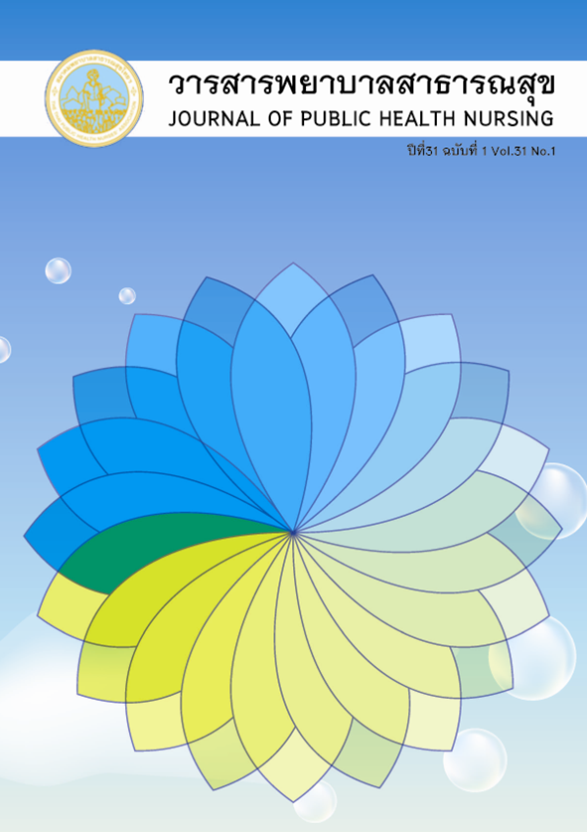ปัจจัยที่มีความสัมพันธ์กับอาการผิดปกติของระบบโครงร่างและกล้ามเนื้อ ของผู้ช่วยแพทย์แผนไทย ในโรงพยาบาลสังกัดกระทรวงสาธารณสุข ภาคตะวันออก ประเทศไทย
Keywords:
อาการผิดปกติของระบบโครงร่างและกล้ามเนื้อ, อัตราความชุก, ผู้ช่วยแพทย์แผนไทย, ปัจจัยจิตสังคม, การยศาสตร์, Musculoskeletal disorders (MSDs), Prevalence, Thai traditional massage practitioners (TTMPs), Psycho-social factors, ErgonomicsAbstract
การศึกษาครั้งนี้เป็นการศึกษาเชิงพรรณนา มีวัตถุประสงค์เพื่อศึกษาอัตราชุก และปัจจัยที่สัมพันธ์กับความผิดปกติของระบบโครงร่างและกล้ามเนื้อของผู้ช่วยแพทย์แผนไทย ในโรงพยาบาลสังกัดกระทรวงสาธารณสุขภาคตะวันออก จำนวน 227 ราย ด้วยวิธีการสุ่มตัวอย่างแบบชั้นภูมิแบ่งกลุ่ม เก็บรวบรวมข้อมูล โดยให้กลุ่มตัวอย่างตอบแบบสอบถามด้วยตนเอง ตั้งแต่เดือนธันวาคม 2558 ถึง เดือนมกราคม 2559 เครื่องมือที่ใช้ในการเก็บข้อมูลคือ แบบสอบถามที่ผ่านการตรวจสอบความตรงเชิงเนื้อหาโดยผู้ทรงคุณวุฒิ และทดสอบความเที่ยง ได้ค่าสัมประสิทธิ์อัลฟ่าของครอนบาค เท่ากับ 0.89 และ 0.92 ตามลำดับ วิเคราะห์ข้อมูล ด้วยสถิติทดสอบไคสแควร์และสถิติการถดถอยโลจิสติค
ผลการวิจัยพบว่า ผู้ช่วยแพทย์แผนไทยมีความผิดปกติของระบบโครงร่างและกล้ามเนื้อ ในช่วง 12 เดือนก่อนทำการศึกษาเท่ากับ ร้อยละ 92.5 โดยมีอาการผิดปกติบริเวณไหล่ในสัดส่วนสูงสุด ร้อยละ72.7ผลการวิเคราะห์สถิติการถดถอยโลจิสติค พบว่า ระยะเวลาการปฏิบัติงานต่อวันเวลาการพักระหว่างการนวด ท่าทางการทำงานซ้ำซาก และข้อเรียกร้องจากงานมีความสัมพันธ์กับความผิดปกติของระบบโครงร่างและกล้ามเนื้ออย่างมีนัยสำคัญทางสถิติ (p-value < 0.05)
ข้อเสนอแนะจากการศึกษาครั้งนี้ ผู้บริหารโรงพยาบาลควรมีการปรับปรุงลักษณะการทำงานของผู้ช่วยแพทย์แผนไทยโดยกำหนดให้มีระยะเวลาพักระหว่างการนวดไม่ตำกว่า 15 นาที และระยะเวลาการปฏิบัติงานไม่เกิน 8 ชั่วโมงต่อวัน ลดข้อเรียกร้องจากงาน และให้ความรู้แก่ผู้นวดแผนไทยให้มีท่าทางการทำงานที่ถูกต้อง เพื่อลดความความผิดปกติของระบบโครงร่างและกล้ามเนื้อ ของผู้ช่วยแพทย์แผนไทย
Factors related to musculoskeletal disorders among Thai traditional massage practitioners in hospitals under the Ministry of Public Health, the eastern region of Thailand
The purpose of this descriptive research was to investigate the prevalence and risk factors associated with musculoskeletal disorders (MSDs) among Thai traditional massage practitioners (TTMPs) in hospitals under the Ministry of Public Health in the eastern region of Thailand. A sample of 227 TTMPs was selected using stratified cluster sampling. Data were obtained using self-administered questionnaire that had been pretest for content validity and reliability resulting in Cronbach’s alpha Coefficients of 0.89 and 0.92. Statistical analysis was performed using Chi-square and Logistic Regression.
The results showed that 92.5% of TTMPs experienced MSDs at least once in the previous 12 months with the highest prevalence of symptoms found in the shoulders (72.7 %). Logistic regression analysis revealed that the number of working hours per day, duration of break time, repetitive motion, and psychological demand were significantly associated with MSDs (p- value <0.05).
These findings suggest that hospital administrators should adjust working conditions to provide TTMPs a minimum of 15 minute-breaks between each massage, working hours of not more than 8 hours per day, and less job demand in order to reduce mental exhaustion. In addition, knowledge and training regarding ergonomic working posture should be provided to prevent MSDs among TTMPs.
Downloads
How to Cite
Issue
Section
License
บทความที่ตีพิมพ์และแผนภูมิรูปภาพถือเป็นลิขสิทธิ์ของวารสารพยาบาลสาธารณสุข (Thai Public Health Nurses Association)







